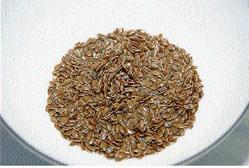
Eulalee Thompson
Renewed interest in flaxseed (commonly known here as linseed) positions the edible seed as an important addition to daily diet. Its claim to renewed fame rests on its three important constituents:
It is an excellent plant source of good, disease-fighting fat, namely omega-3 fatty acids. It is rich in fibre containing about three grams per tablespoon and It contains lignans, a phyto-oestrogen with apparently significant medicinal value; it is believed to be able to curb cell growth in cancer.
For women's health
The tiny reddish brown seeds are useful in women's health issues. Various studies point to their possible usefulness in prevention and reduction of tumour growth in the breast and in the relief of menopausal symptoms in particular, hot flashes.
One small study of 29 women, for instance, published in the Journal of the Society for Integrative Oncology showed that the women had 50 per cent fewer hot flash events each day when two tablespoons of ground flaxseed was added twice daily to their diet. The ground flaxseed was taken in cereal, juice, fruit and yoghurt. The women in the study also reported a reduction of 57 per cent in the intensity of their hot flashes during the study.
The six-week preliminary study which was conducted at the Mayo Clinic in the US studied women who had been having 14 hot flashes per week for at least one month. The women in the study were not taking oestrogen therapy to relieve their symptoms. One week of the study was spent recording hot flashes and quality of life issues; in the second week the ground flaxseed was added to the diet.
For men's health
Flaxseed is also useful in men's health, based on the studies now being published. It provides possible support in prevention and reduction of tumour growth in the prostate.
In one study, for example, presented at the American Society of Clinical Oncology, tumour growth slowed down in 161 men diagnosed with prostate cancer and scheduled to remove the tumour through surgery after ground flaxseed was added to their diet. The 161 men were divided into four groups one month prior to their surgery.
These were the groups:
1. Men following their regular diets.
2. Men who took 30 grams of flaxseed each day
3. Men who restricted their fat intake to less than 20 per cent of total calories and
4. Men who took flaxseed and restricted their fat intake.
The researchers at Duke University Medical Centre found that tumours (measured by how fast cancer cells were dividing) grew 30 to 40 per cent slower in the men taking flaxseed. A diet low in fat did not appear to have any effect on tumour growth in this study.
Using flaxseed

Flaxseeds - Andrew Smith/Photography Editor
Flaxseed is sold here in health food stores either as whole seed, ground flaxseed or in oil. The oil form does not contain the lignans which, as mentioned before, is thought to curb cell growth in cancer nor the fibre but has the omega-3 fatty acids.
The ideal way to add flaxseed to the diet, based on the studies, is to ground it (you can use a coffee bean grinder). The ground flaxseed has a shorter shelf life in terms of the availability of its nutrients. The whole seeds have a long shelf life but digestion may not be as complete as with the ground seeds.
Most researchers seem to recommend one to two tablespoons of ground flaxseed each day as safe and effective. Flaxseed can be added to bread dough, pancake, muffin, cookie mixes and so on before baking. It can also be added to cereals, yoghurt, juices, fruit salads and so on. In Jamaica, it is usually added to Irish moss drinks.
eulalee.thompson@gleanerjm.com

